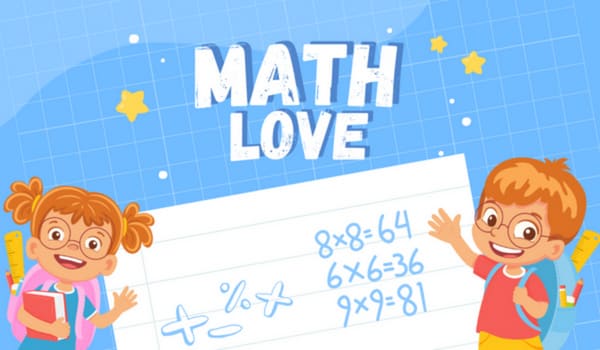Children despise math for a wide range of reasons. Some discover it excessively hard, others think that it’s staggering. Yet still, others are so exhausted by it that they can barely force themselves to finish their tasks. And then they go like I hate math and we have no solution out of it. In any case, whatever the explanation, nothing ruins a day (and mother’s nerves) like quarreling over math. The steady contending, whimpering, and crying overflow past math time and make the entire day hopeless. No wonder the majority goes like, I hate math.
Handy solutions like prizes and sticker graphs once in a while make math passable for a couple of days. Be that as it may, in a little while, the math fights start once more. No big surprise a few families wind up doing less and less math at home. With an end goal to keep the harmony. However, with the consistent concern that they’re not setting up their kid sufficiently and they let eh attitude of I hate math develop more.
Not all children will revere math. However in the event that math is a ceaseless battle at your home. These procedures will help stop math battles. And make math time increasingly average. For both you and your kid:
Discover the Goldilocks challenge level:
Consider when you were profoundly occupied with your learning. It might have been talking about an extraordinary book with a companion. Figuring out how to stitch from your grandma. Or acing a piece on the piano. However, whatever it was. One reason you likely discovered it so fulfilling was that you were working at your Goldilocks challenge level. Not very simple, not very hard, yet just right.
Finding the correct degree of challenge is vital to helping kids appreciate math, as well. There’s no fulfillment in zooming through simple busywork issues. Yet it’s baffling to work on issues that are excessively hard.
At the point when children are baffled with math. Numerous guardians quickly consider shutting the coursebook. That may without a doubt be a decent choice. However, there are different approaches to change the trouble level, as well.
Do fewer issues:
On the off chance that your kid is depleted or overpowered by the length of their tasks, abbreviate them. Your kid doesn’t need to do each issue if it will make that person hopeless. Skip issues that are excessively simple. Chip away at simply the chances or levels. Or basically select the issues that your kid most needs to take a shot at.
Accomplish more practice and survey:
While a few children need to do fewer issues so as to not loathe math. Other youngsters may really need to accomplish more. In the event that your kid is experiencing difficulty holding what he’s now realized. Return, and ensure those aptitudes are sharp before proceeding onward.
Each progression in math expands on one another. And it’s baffling to children to continue pushing ahead. When they’re feeling the loss of a portion of the structure squares. Ensure your kid has the math realities aced and essential abilities strong before you move onto increasingly complex work.
Set a clock:
In the event that your kid has a limited capacity to focus. However, needs a great deal of training in math. You can make math less hard for them by breaking tasks into little pieces. Set a clock and request that your kid accomplish quality work for a brief timeframe. Children are regularly stunned at the amount they can complete. When they simply put their heads down and get the opportunity to labor for 15 minutes. What’s more, make a point to keep your desires practical. Particularly for minimal ones. Kindergartners and first-graders regularly can just concentrate on for five to ten minutes one after another.
Require less composition:
Real physical agony makes anything significantly less agreeable. More kids who have just done composition, spelling, and copy work. Might do not have the endurance left for duplicating issues from a coursebook or working out numerous answers. On the off chance that your kid experiences difficulty with this. Don’t expect them to duplicate from a coursebook. Or then again, permit your kid to reply whatever number issues orally as could be allowed. On the off chance that you are working out of a coursebook you own. Permit your kid to (pant!) compose legitimately in the reading material. It costs some extra, however dispensing with math fights is well justified, despite all the trouble.
Another approach to make writing in math less difficult is to take care of issues together on a smaller than normal whiteboard first. It’s a lot simpler for children to compose on a whiteboard than with a pencil on paper since they don’t need to focus on such a great amount on keeping their numbers perfect and appropriately estimated. Additionally, working issues together on a whiteboard is likewise an extraordinary answer for kids whose consideration will in general meander in the event that you leave them in a room without anyone else with a math task.
Backing and guide your math student:
At the point when I was in school, I was battling in one of my math classes. Following quite a while of feeling proficient and positive about math, I was shaken and questioning myself when I went to my teacher’s available time for help. Rather than helping me comprehend what I was fouling up or clarifying the material in another manner, he offered me probably the most unhelpful guidance I’ve at any point gotten: gaze at the issues longer.
Obviously, that class was not a fantastic learning experience. (I wound up battling along without anyone else and scarcely passing—and settling that when I was a math instructor, I would be increasingly useful!) If you’re not an enthusiast of math yourself, you most likely have a comparable story. In any case, in the event that we need our children not to detest math, it’s fundamental that we backing and guide them in their learning.
Model an uplifting disposition toward math yourself:
In the event that you don’t care for math yourself, I realize it very well may be difficult to counterfeit an inspirational disposition. Be that as it may, we guardians set the pace for our homes. At the point when we’re hauling, everybody’s hauling. At the point when we’re invigorated and positive, the children are significantly more liable to be, as well.
In the event that you don’t care for math and think that it’s difficult to marshal an uplifting disposition, just attempt to be unbiased. Try not to speak adversely about math, and attempt to put a grin all over when you report that it’s math time. Indeed, even a smidgen of energy can go far.
Educate, don’t simply relegate: I hate math!
There are two colossal downsides to sending your kid off to take a shot at math without anyone else.
To begin with, kids partner math with expulsion and not standing out enough to be noticed until they have an issue. This really makes a few children bound to misbehave. In turn, their opinion changes entirely and they start muttering I hate math, every time you sit them down to study. since it’s the best way to stand out enough to be noticed during math time. Furthermore, for our outgoing children, it’s difficult for them to like a subject that they generally need to do without anyone else.
Second, when children do math all alone, they’re regularly ready to limp along and find most solutions right. Be that as it may, would they say they are truly perusing the exercise, thoroughly considering it, and disguising it? Do they truly comprehend what they read and did? Except if you have a diligent and mindful understudy, a youngster who does math all alone is typically passing up the more profound understanding that originates from working through the exercise with a parent. Tutoring your autonomous math student doesn’t need to take quite a while every day, except even five minutes will go far to help your kid feel upheld and empowered in their math contemplates.
Utilize an instructor’s guide:
Those instructor’s aides are an abundance of valuable data. Most will assist you with understanding the primary target of the exercise and give you a few different ways to exhibit the idea. Some will even give games and exercises to strengthen what your kid is realizing and add some amusing to your math time. Regardless of whether you don’t do each movement they suggest, they’ll assist you with training math well.
Develop your own math aptitudes: No more I hate math!
You don’t need to be a math star to assist your kid with math, however, it’s difficult to control what we don’t get ourselves. On the off chance that math was consistently a troublesome subject for you, there are a huge amount of good assets out there to assist you with figuring out how to show math with certainty.
In the event that you like to learn by perusing, I’ve assembled a book rundown of my preferred books for mothers who instruct math. Or on the other hand, if you’re lean toward recordings, look at my video courses at the Well-Educated Mind Academy on rudimentary number juggling.
Help your kid feel a feeling of achievement:
Suppose you were let you know needed to figure out how to knit a scarf—yet that you would be taking a shot at sewing a similar scarf, for quite a while, a great many exercises, for the following 12 years! That is the means by which math feels for some children. Helping your youngster feel a feeling of achievement in math forestalls the day by day schoolwork battle from feeling like ceaseless drudgery.
Show your kid both how to do the math and why it works:
It feels great to find solutions right, yet working through systems you don’t comprehend—again and again, all day every day—doesn’t give a very remarkable sentiment of fulfillment. Children appreciate learning math more when they comprehend what they’re doing and get the opportunity to have those delightful moments of realization when an idea out of nowhere clicks.
Urge your kid to consider what she’s doing and why. Assist her with seeing the associations between what she’s realizing and what she definitely knows. Also, use manipulatives to help make new ideas concrete and visual. At the point when children learn math with comprehension, they get more issues right, however, they likewise feel a more prominent feeling of pride and fulfillment in their math learning.
Go over finished tasks together:
Don’t simply address math all alone after the youngster has gone to play. Rather, make time to go over finished tasks together. Notice all the right answers first, at that point break down the mistaken answers with your youngster. Request that your kid right any thoughtless missteps and work together on any issues your kid experienced difficulty with. In the event that you find that your kid didn’t comprehend the idea well, make a note to handle it again the following day.
Investigating the work together enables your kid to feel responsible for learning and a more prominent awareness of other’s expectations. Also, you show your kid that gaining from botches is a piece of the learning procedure.


